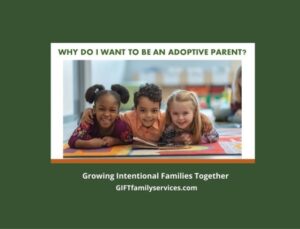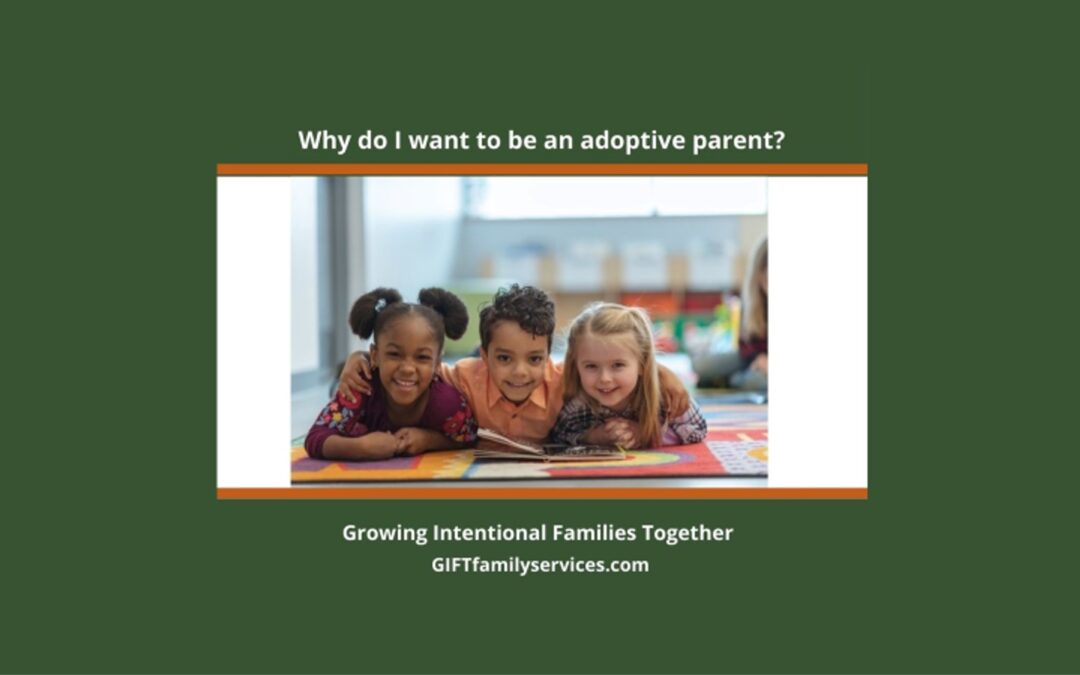
Why do I want to become an adoptive parent? If adopting is on your radar, it is essential to be clear in your own mind about your reasons for wanting to become an adoptive parent. This helps you make an informed decision—one that is not based ONLY on emotions. So, it makes sense to consider your motivations carefully. Choosing to become an adoptive parent is a life-changing decision for you and, of course, for the child you may eventually adopt. You want to be certain that it is the right choice for you.
(And, if you are already an adoptive parent, it is worth revisiting this question.)
Our experiences as adoption coaches and adoptive parents tell us that most people who considered adopting a child were asked this question by the professionals evaluating them and the expectant moms interviewing them. Your family and friends will also be curious about your reasons.
Clarifying your WHY will reveal if adoption is actually the best way to fulfill your motivating desire.
Knowing your “Why” also helps you clarify the “How” of your parenting
These two questions/concepts are inextricably connected. There are many avenues to adopt a child. For example, if helping an older child is your primary motive, then adopting from foster care will be your likely path.
Your “Why” will guide your parenting style
If you want to be the best adoptive parent possible, then it will propel you to learn as much as you can about the complexities and hard realities of adoption.
People have many reasons for wanting to adopt a child.
These reasons tend to fall into two categories. Some are more parent-centric and some are more child-centric. The way you prioritize these answers influences your beliefs, actions, behaviors, expectations, your parenting approaches, and your criteria for success.
These are some that we have heard from others:
- I/we want to make a difference in a child’s life.
- I/we believe every child deserves a settled, safe family, especially kids in foster care.
- A family member asked us to adopt their child because they are unable to parent him.
- I want to adopt my grandchildren so they can have permanency and stability.
- We’ve dreamed about being parents but I’m not able to conceive or carry a child to term.
- We have lots of love to give and want to help a child in need.
- We believe that it is our Christian duty to adopt.
- My/our parents yearn for a grandchild and we want to continue the family name.
- I have always, always wanted to adopt.
- We can provide a child with a better life.
- We are a same-sex couple who want to be parents.
(Those a just a few of the many reasons we have heard)
Defining success as an adoptive parent
To have a clear picture of what it means to succeed as an adoptive parent, you have to know and understand the needs of adopted children. This will help you identify where you can find reputable sources for this information. You will likely discover that you will have to unlearn some myths and learn how to refute common misunderstandings about adoption.
We have posted our Adoption Philosophy document at Growing Intentional Families Together. We invite you to read this document. We believe it will help you expand your understanding of the adoptive family experience. Most importantly it will help you be a better parent through understanding Adoption Complexity. This knowledge can also assist you in deciding to adopt or choosing not to adopt.
Ask yourself these questions as you consider becoming an adoptive parent
- What are your personal beliefs about adoption?
- What is your definition of a good parent?
- What is your definition of a good adoptive parent?
- What do you believe are your responsibilities as an adoptive parent?
- What responsibilities do you believe you have regarding your child’s birth parents?
- How will you know you have been a good adoptive parent? Specify your criteria.
- What did you learn and what questions arose when you read our Adoption Philosophy document?
Hindsight is 20/20
The purpose of adoption is to provide families for children who need them. Adoptive parenting requires parents to live from a child-centric perspective that focuses on meeting the child’s need for love, healing, and validation.
An additional question to ask yourself is: “Am I ready to accept that being an adoptive parent means recognizing and accepting additional responsibilities?
Once you know the answer to this and the previous questions, you will be on your way to making a well-informed decision that is not only right for you but also one that benefits your child should you adopt one.
Listen to our podcast featuring

Adoption Attuned Parenting
Grows happier, healthier adoptive families
 ABC, Adoption & Me We’re Adopted, So What? Reimagining Adoption: What Adoptees Seek from Families and Faith
ABC, Adoption & Me We’re Adopted, So What? Reimagining Adoption: What Adoptees Seek from Families and Faith



